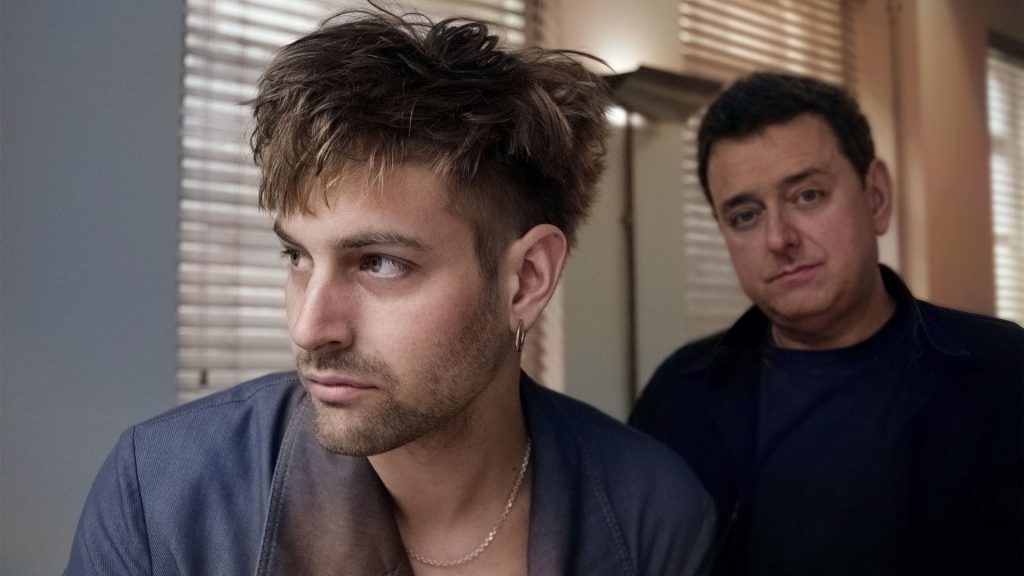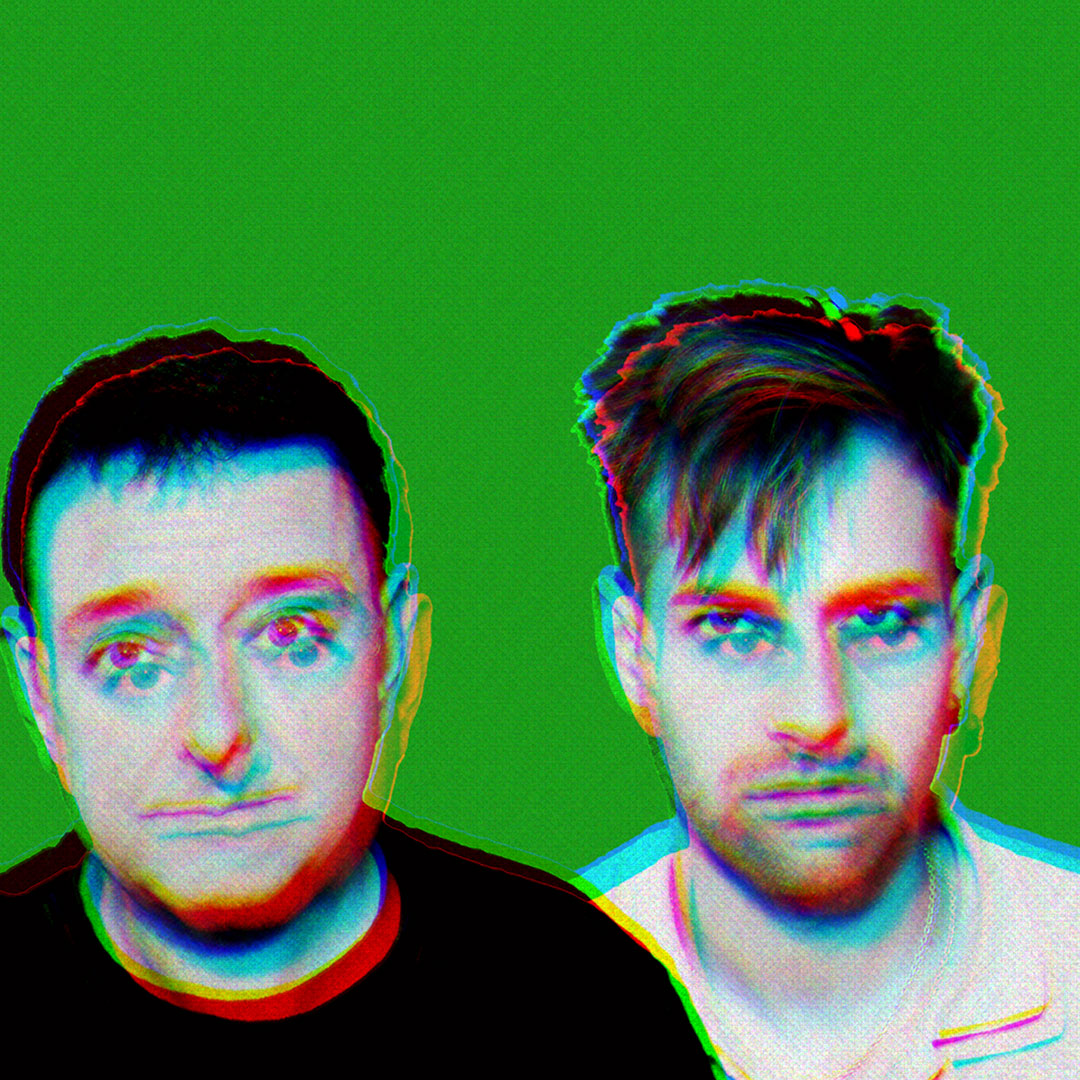In the early 2010s, the late musician and producer Andy Gill chose the London musician John Sterry (also p/k/a JJ Sterry) to front his long-running and legendary post-punk band Gang of Four. At this time, Gill was working with Santi Arribas, the producer, guitarist, and founding member of the blues-rock band The Roadside Bandits Project, in his production studio. Arribas worked as an engineer on Gang of Four’s 2015 album, What Happens Next, which featured Sterry on vocals.
Through this, Sterry and Arribas formed a friendship. In 2023, three years after Gill’s passing, the two began working on material for The Roadside Bandits Project’s second album, The Siberian Candidate. Enjoying the experience, the two began gradually crafting more songs, which eventuated into a new project called Rear Window.
In April, Rear Window’s debut album, Happiness By Design, was released via the London-based indie label Dharma Records. Sterry and Arribas took some time to talk with us about the record, its themes, and the future of the project.
—-
Congratulations on the release of Happiness By Design! How have you found the reception?
Santi: Thank you! Very good, actually. The reviews have been great, and the album has been received very well on radio, not only in the UK but internationally. We’re very pleased with the feedback we have received.
I understand that you two met through the late, great Andy Gill. What did you find were your musical overlaps, and where were the big disagreements in terms of what you liked?
Santi: Despite doing very different things individually, we happen to have very similar tastes in music, I think, mostly because we both tend not to focus on one genre when it comes to listening to music. John leans more towards the folk and acoustic in his writing, whilst I lean towards blues, rock, and electronica. We meet somewhere in the middle, where we don’t think so much about specifics and allow ourselves to throw into the mix stuff that we wouldn’t usually do individually. Obviously, working with Andy for a decade has had an impact on how we both see writing and production, and that is, I think, where the overlap you mention is. We don’t dismiss anything just because it is not genre-specific, as long as it serves the song.
How long was the timeline for completing the record? My understanding is that Rear Window began in 2023, and, from an outsider’s perspective, the turnaround rate from beginning to having your debut album seems quite quick. Has it felt rapid or sluggish to you?
John: It wasn’t really supposed to be an album; we were going to just do an EP, but kept writing songs. It felt pretty natural, and it wasn’t done in one big block session – it was a session a week, fitting it in around everything else we’re doing.

Photo courtesy of Futureproof Promotions
The musical arrangements on the record are very versatile. Was exploring a wide range of sonic expression a consideration from the get-go, or was that simply what organically materialised? In some ways, this music departs from your other projects (Gang of Four and The Roadside Bandits Project), but in other ways, you can see the throughline from there to here. Was there a conscious decision to divorce Rear Window from your other works?
John: Yeah, I don’t think there was much question about whether we keep any of these songs for our other projects; it felt quite clear that each song was a Rear Window song, even though the style varied between tracks.
From my perspective, each song’s topic appears individualistic. From my understanding, you two just wrote one song together, which turned into two, which turned into an album’s worth. Were the tracks written with any continuity in mind, or was it a matter of writing what each song needed to be and trusting that it would work when compiled together?
John: Lyrically, there’s definitely a theme that became apparent quite early on, but it wasn’t necessarily planned; it just came out that way. I think the title of the album kind of sums it up – there’s a search for happiness, and the songs pivot between whether you can find that externally or whether it’s a more introspective thing.
Santi: We just worked on one song at a time. We would write, record and mix it and then move onto the next one, whichever way it went. There is an obvious continuity, but never intended – I think that’s only natural to end up with some basic form of cohesiveness at the end of it, but, yes, luckily everything seemed to have compiled nicely in the end, or at least it is how it feels to us.
Did you have complete confidence that you could successfully tackle the diversity required through both of your extensive experiences as producers and musicians, or were there moments which challenged what you knew?
John: Often, the seed of the song was planted by Santi making a basic demo. Normally, I’d write the music and melody/words at the same time, so shaping my ideas around something already half-formed was sometimes a challenge, but I think the most interesting stuff comes about this way.
Santi: Weirdly, we didn’t have a single argument during the entire process. Perhaps the odd difference of opinion every now and then, but that would usually be about something very specific, and we always managed to find a way to keep us both happy with the outcome.
Your project’s name, obviously, invokes the Hitchcock film, in which James Stewart’s injured protagonist observes the outside world through his camera and makes assumptions about other people’s actions. In a way, is that a meta-commentary on being an artist who is observing the actions of yourself and others and trying to make sense of them through an artistic medium?
John: I think there’s always a question of whether you can see the world clearer when you’re fully entrenched in it or whether, as an artist, it’s better to have a degree of separation in order to observe from a distance.
I noticed that some songs harken to locations, particularly “Give My Regards.” Do you feel that geography plays a part in your art? Do you think that external stimuli, such as the place and the time of day that you write or craft songs, influence your mood and what you are inspired to make?
John: It’s probably the other way round – the way you feel is intrinsically linked to a place and a time. I use ‘place’ in songs as it can be used symbolically, but it’s mainly just to serve the idea I’m trying to get at.
The album, whilst primarily featuring differing subject matters, does end up capturing a mosaic of modern living; with “Rocket Men” – a critique of consumerist attitudes (which, incidentally, features my favourite line, Say I’d invented a time machine/I bet you’d see it as a get-rich-quick scheme) – being the prime example. Was there any theme in mind from the outset, did it develop during the production, or did you look back at the finished project and realise the throughline retrospectively?
John: Maybe I have touched on this before, but “modern living,” as you put it, definitely became a thread throughout the project, and how that relates/competes with self-fulfilment and happiness.
Santi: “Rocket Men” does touch on consumerism, and, as John says, there is a thread throughout the album, but this particular song talks about billionaires and their disproportionate amount of financial power and, more recently, political influence. The idea behind the song came from a conversation with Andy Gill’s wife, author Catherine Mayer. She had just finished writing a novel titled TIME/LIFE that explores that idea of a billionaire building a time machine and what he would do with it. She wanted to include music in the audiobook version of the novel, so we ended up writing the song with her. It is featured at the end of the audiobook, but we also used bits from it at the beginning of every chapter as a sort of soundtrack.
Rear Window is signed to Dharma Records. Why did this label feel like the right move for the project?
Santi: I’ve been with Dharma for several years now, they have published both albums from The Roadside Bandits Project, and they’ve always been great with me and great supporters of the music, so it was a no-brainer to ask if they were interested in Rear Window. It’s a great label that really believes in independent musicians.
Now that the project is established and you have your first record out, what are your future plans for Rear Window?
Santi: We are both working on our own projects right now. John has just released the first single for his upcoming EP as JJ Sterry, and I’m busy producing and mixing for other artists right now, so we don’t have immediate plans, but I’m sure we’ll get together soon enough and see what we can come up with.
Rear Window’s debut album, Happiness By Design, is out now. You can keep up with the band through their website and Linktree.

Aaron Kavanagh is the Founder and Editor-in-Chief of Post-Burnout. His writing can also be found in the Irish Daily Star, Buzz.ie, Totally Dublin, The GOO, Headstuff, New Noise Magazine, XS Noize, DSCVRD and more.

 POST-BURNOUT
POST-BURNOUT